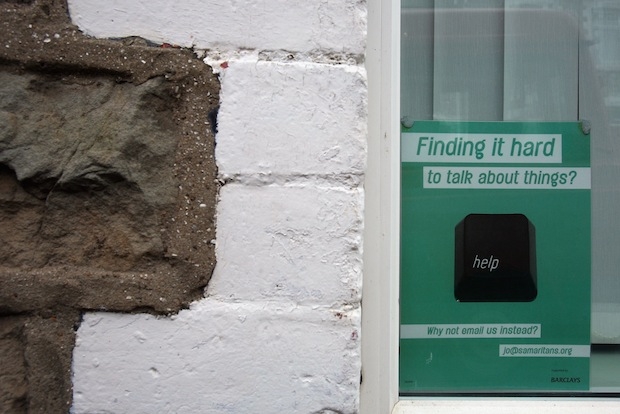According to an email I received earlier this afternoon, I should be worried about the mental state of someone I know. An alert popped up in my inbox from an app called ‘Radar‘ which the Samaritans launched this week, telling me a tweet from someone I followed might suggest they were contemplating suicide. Here’s the tweet:

Clearly the Samaritans need to work on their formula, otherwise I’ll be receiving daily alerts whenever Jim Murphy warns against Scottish Labour committing electoral self-harm or one Conservative faction warns another faction that it is being politically suicidal.
The Samaritans say they pursued the app, which monitors certain words and phrases in tweets before alerting users signed up to the service, because social media ‘is increasingly being used as an outlet for people to share their feelings’ and that ‘there are some who may go online in the hope that someone will reach out and offer support’. Chances are that most of the tweets Radar picks up will use those trigger words figuratively, but then again the chances are that the one person whose crisis is highlighted by the app will be quite grateful for it.
Then again, the app hasn’t gone down particularly well with mental health campaigners or those interested in privacy and civil liberties who are worried not just about the initial collection of data by the charity, but by its offer of a ‘whitelist’ of those who don’t want to be monitored by it, which is itself another form of data collection. But on the other hand, if you’ve tweeted something, it’s hardly private, is it?
I’ll leave the debate about the whether the Samaritans are right to use Twitter as an ‘important surveillance tool’ (their words) to Jamie once he’s disentangled himself from the charity’s monitoring process. But the motivation for creating the app is still an interesting – if not particularly effective – attempt by a charity to address the changing ways in which we relate to one another.
Being a good Samaritan might look rather different in practice today than 50 years ago. People who are suicidal aren’t always particularly easy to spot because mental illness often makes someone withdraw from relationships and feel they are a burden on friends and family who would dearly love to know what they are really thinking. But the generation Radar is aimed at, the Millennials, are often also naturally distanced from their nearest and dearest because they no longer live near them, having moved for work, university, or love. When I think about my own closest friends, not one of them lives within 25 miles of where I am, and so quite often the first anyone will know of a close friend’s crisis will be through an email or a Facebook message. And that’s assuming that someone is in the frame of mind to even admit they need help: often it’s someone’s behaviour that first alerts you to a serious problem. This is something the Radar app will struggle with, and you still need to have a real friendship with someone before you can tell whether their worrying Facebook post is simply a dramatic turn of phrase or a real emergency.
It’s not just charities dealing with mental health and suicide who are adjusting to the changes in the way people form close bonds and communities, though. Take food banks. They first started appearing in this country in 2000, and before then families who had no more money for food had to rely on the generosity of a social worker or teacher who had noticed their cupboards were bare. But long before that, a mother who couldn’t feed her children might have been spotted by neighbours who knew her well enough for her to confide that things were very tight, and who would pop round with a loaf of bread when they could. The most cheering thing about food banks is that the instinct of wanting to love and help your neighbour is still clearly alive within so many of us today, but because so few of us really know our neighbours, we need a more organised way of popping round with a loaf of bread.
That isn’t to say, by the way, that food banks are entirely caused by people not knowing their neighbours so well: the factors behind demand for emergency food parcels are many and complex and despite ministers’ protestations to the contrary, government has got a fair bit to answer for too. But those food banks, like the Samaritans app, do suggest communities trying to create a modern way of loving your neighbour, sometimes effectively, and sometimes not.







Comments